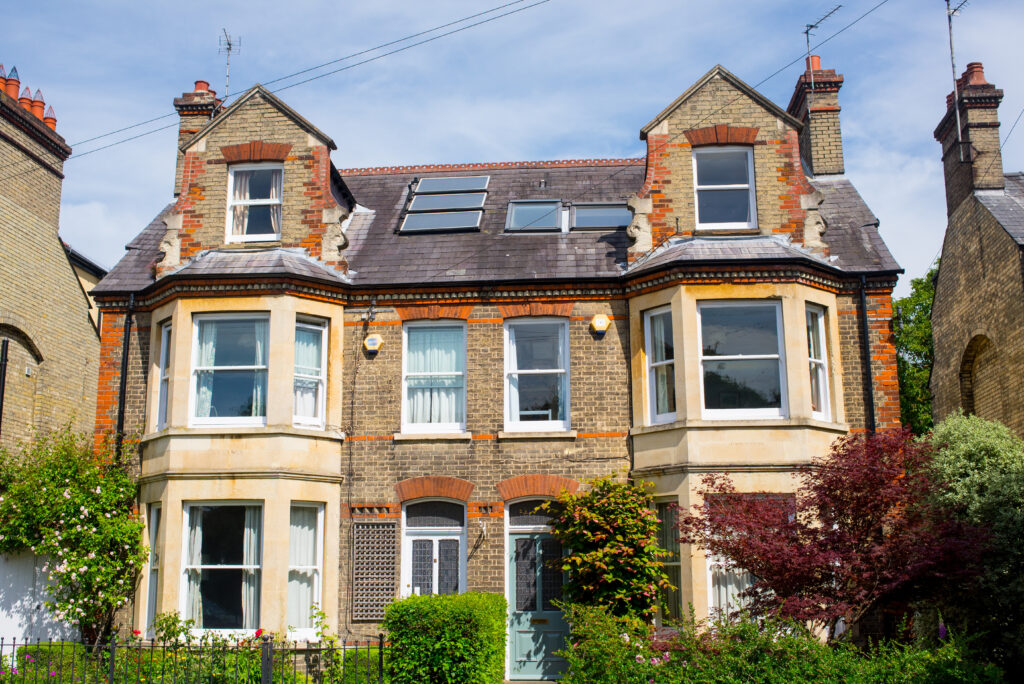Auction Finance Solutions for Successful Bids

Bridging Finance to buy property purchased at auction.
You normally have four weeks to complete on a purchase when buying a property at auction.
Traditional mortgage lenders find it difficult to complete within such a short period of time.
Modern methods of auction can allow longer so always check your contract to see how long you have.
There is a solution with a type of bridging finance called Auction Finance.
We have access to lenders who can provide a decision in principle on the property for you before the auction date to give you the comfort it can be financed subject to valuation.
We will always focus on how the bridging loan will get repaid. We see a lot of clients whose brokers have not considered this which can cause problems later in the process.
Case Study
Situation
We were approached by an experienced HMO property investor who had bought a property at auction. It was a tired six bedroom property in South London for £900,000.
It had no licence and wasn’t mortgageable due to its condition.
The client had been speaking to his existing broker who told him he could get a buy to let mortgage on the property. When the valuation was received the lender declined it, due to its condition.
He was now two weeks into the four week timescale and was in danger of losing his £90,000 deposit and the potential of being sued.
Our Response
We needed a lender who could deliver within this timescale and we knew we could get an offer out quickly from of our lenders who would prioritise the case due to auction conditions.
We were more concerned about the client’s solicitors and their ability to deliver.
We knew a firm who was on our lender’s panel very well and after speaking to them they confirmed they could act for both the client and the lender and were confident that the deadline could be achieved.
As we knew the lender’s criteria we instructed the valuation before the application had been assessed and the lender’s solicitor emailed their requirements across to the sellers whilst we waited for the report. Three days later the valuation was back and acceptable.
Result
All the supporting documentation was provided by the client quickly to his solicitors who were now ready to complete by the due date.
The client successfully updated the property and it’s now a profitable addition to his portfolio.
If you need more information on Auction Finance contact us on 01565 654005
Auction Finance Questions
-
What is Auction Finance?
A form of short-term finance also known as bridging finance.
It’s used to finance properties purchased at auction as you usually have 28 days to complete although could be less or more.
Long-term lenders are usually not quick enough to deliver within this timescale.
-
Pre Approval
Yes you can.
Please send a link to the auction house, lot number, your bid price, details of the project and your experience along with costs, timescale and end value.
We will approach lenders on your behalf to obtain competitive funding so you have the comfort of having the finance in place before bidding commences.
-
What kind of properties can you finance?
Auction Finance can be used for the purchase of residential and commercial property including offices, retail and industrial units.
-
How much can I get?
Between 75% – 85% loan to value (LTV) of the lower of purchase price or valuation on residential with most lenders and with some based on the valuation.
As well as finding money for the deposit, in most cases you will have to pay the lenders interest and fees upfront.
With commercial property the LTV is usually 65% – 75%.
-
What will it cost?
It’s dependent on you, the property, your intentions and the amount of the loan.
Buying a property to do a light refurbishment will have a lower rate than a basement or loft extension.
As well as the setup fee which typically is 2% there will be a monthly interest rate, valuation fee and usually two sets of solicitors.
Normally you would appoint your own and pay for the lenders. There are some lenders who allow you to use theirs which reduces costs and speeds the process up.
If there is heavy refurbishment and you are borrowing against the future value of the property there may be additional monitoring costs as well.
There will also be a broker fee for the work involved in arranging the finance and dealing with all parties to ensure that it completes on time.
We are very transparent and will provide details of the rate and fees before you enter into any commitment.
-
How is interest calculated?
Most lenders retain interest, and a minority roll it up and if you have plenty of surplus cash per month you might get serviced.
Retained and rolled up interest is deducted from the amount you wish to borrow.
You have to find sufficient funds to cover the interest for the period of the loan as well as the deposit.
Retained is the most common and for the majority of the lenders this is the only option you have.
Serviced is like a traditional mortgage when you are allowed to pay the monthly interest from your income.
-
Maximum Term
We usually arrange a term of between nine and 12 months.
That gives you sufficient time to complete the project and either sell or remortgage.
If it’s a longer project we have lenders that go up to 36 months.
-
Repayment
If you only remember one point from this page this should be it. Getting into bridging is a lot more straightforward than getting out. If you are looking to sell to repay the loan you need a plan B, which is usually a remortgage of the property.
When we receive an enquiry we spend our time initially on it’s repayment which gives the lender and more importantly you, the confidence that all your options have been considered.
The last thing anybody wants is sleepless nights worrying how a loan is going to get repaid.
Unfortunately we have seen numerous examples where the focus has purely been the bridging loan and the exit hasn’t been considered.
-
Is a valuation needed?
There are some lenders who don’t require valuations and this is a major selling point, however in our experience it is recommended.
If you don’t get one, when it comes to sell or remortgage and the valuer identifies a problem that hasn’t been rectified you may not be able to repay your bridging loan on time.
It’s far better to know any issues before you do any work as it will be more cost-effective for you.
-
What can catch me out?
All brokers and lenders do not share our morals and quite often you will see a very attractive interest rate to hook you in and further on in the process the rate increases when it’s too late to go anywhere else.
Some lenders have lower rates for shorter terms. You need the term to finish what you want to do and then sell or remortgage.
There are also lenders who offer lower rates for the first 3-6 months of the loan but increase them considerably after that.
It can be quite difficult to buy a property, do a refurbishment and remortgage within this period. Often a longer term with a higher rate at the beginning is better value for you.
Watch out for the method of valuation. It should ideally be Open Market Value (OMV) which does not impose a time restriction on the sale. Some lenders work off 180 day or even 90 day which usually is much lower than the OMV.
Finally what’s the reputation of the broker and the lender like? Some of the smaller lenders may not have the money to complete on the loan.
If your broker is not FCA regulated they won’t have direct access to all of the more established lower-priced lenders.
You can check the regulation by looking at the bottom of their emails or website and either they or the firm should be on the FCA Register.
-
Do I need a specialist solicitor?
Yes,Yes,Yes.
You may have the quickest broker and the best lender in the market but if you don’t have a good solicitor the process will be stressful.
It can even result in missing the auction deadline.This means that you could lose your deposit and be sued by the seller.
It’s essential your solicitor has experience of Auction Finance and dealing with a lender’s solicitor, as not many do.
